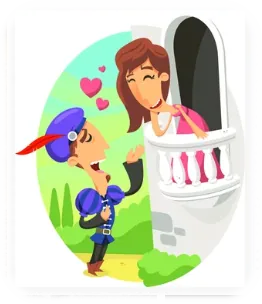Oxymoron Definitions and Examples
Are you ever confused by what people mean when they refer to something as an oxymoron? You're not alone, and it's also not uncommon for people to use the term incorrectly, referring to something as an such when it really isn't. In this quick article, we'll explain exactly what an oxymoron is and provide some examples too. So, read on and be confused no longer - you'll soon be an expert!
If you prefer to learn with audio and video, rather than by reading, the video above will give you explanations and examples. The same video may be viewed here on YouTube.
Exactly what is an Oxymoron?
Well, an oxymoron is simply a term used to describe two words or phrases - which are used together - that either do have, or appear to have, opposite meanings.
It's not right or wrong to use oxymorons – it's just a way to describe a particular type of phrase. Sometimes they’re used deliberately for effect or amusement, and sometimes people use them without even realizing. Other times they're mistakes and really make no sense!
You can actually find writers from hundreds of years ago with the same idea of using contradictory or incongruous elements for dramatic or poetic effect. So oxymorons are definitely not a new thing.
Oxymoron Examples

Romeo & Juliet
As noted above, oxymorons are nothing new, and one of the most oft cited examples from literature comes from Shakespeare's Romeo and Juliet (now more than 425 years old!).
In fact there are several examples from Romeo and Juliet, but probably the most quoted is: "a damned saint, an honorable villain!".
So why is it an oxymoron? Well, there are really two oxymorons here; the first one is "a damned saint". It's an oxymoron because saints are considered virtuous, or one of God’s chosen people, so to describe a saint as "damned" is really saying the exact opposite. And the same thing with "honorable villain". Villains are considered evil or bad, so to call a villain honorable is again using a contradictory adjective. This particular phrase is being used by Juliet to describe her uncertain feelings about Romeo.
She also uses other oxymorons to describe him as a "beautiful tyrant" and "fiend angelical".
The Shakespeare examples are often considered a very beautiful use of language, making the reader dwell on them for just a moment. Others are pretty obvious though (and frequently just an unintended misuse of language). Here are some more examples:
"grow smaller" - You’ve probably heard this phrase before, or even used it yourself without realizing. Again, these two words have somewhat incongruous meanings. "Grow" obviously means to enlarge in some way, whereas smaller has a somewhat opposite meaning. You can imagine someone using this to describe a lake which is becoming shallower over time. They might say something like "The lake has been growing smaller each year for a long time."
In that case, we know what they mean, but rather than it being a poetic Shakespearian type of oxymoron, it’s more of a misuse of words, as it doesn’t really make sense when you think about it.
Here’s another example:
"precision carpet bombing" - Carpet bombing is where war-time airplanes might completely destroy a whole area, and it's notoriously indiscriminate and imprecise. So to use the word "precision" to describe carpet bombing is rather incongruous. The words have opposite meanings to each other; one is precise and the other is imprecise (and, again, makes little sense when you think about it).
Here’s one more:
"alone together" - Well, we kind of know what someone means if they say something like "I want us to be alone together". But of course, by definition, alone means pretty much the opposite of being together ... which is not alone!
Okay, last one. This is actually a quote from National Public Radio in the U.S.:
"One has to say, for the most part, a peaceful revolution is an oxymoron."
So, hopefully by now you can recognize the oxymoron here. Obviously, the ideas of peacefulness and revolution are contrary to each other, as the speaker here notes.
Now You Know!
Anyway, now that you know what oxymorons are, you’ll probably find them everywhere. Like the Shakespeare examples, some are quite clever and poetic - others not so much!
Okay, that’s about it for now! If you'd like to explore some more, you can also find other interesting grammatical and linguistic bits and pieces on this site (click the grammar tag below), and on our YouTube channel.

